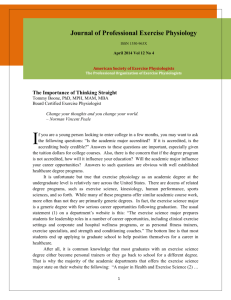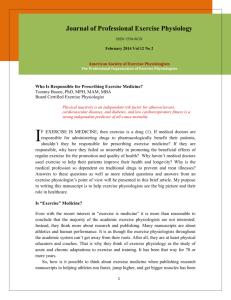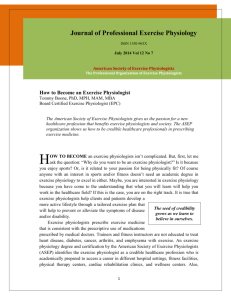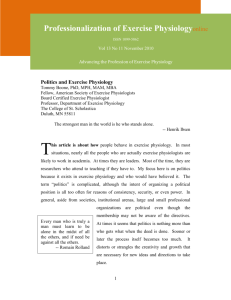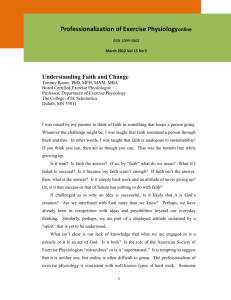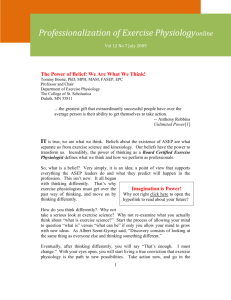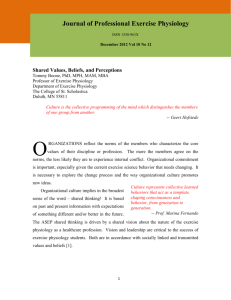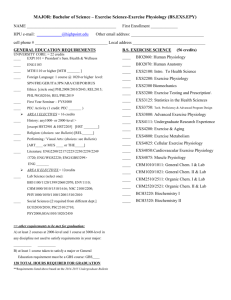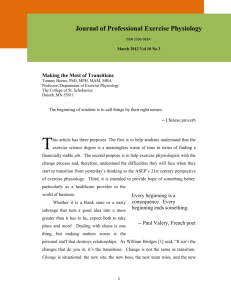The Ultimate Challenge of Change - American Society of Exercise
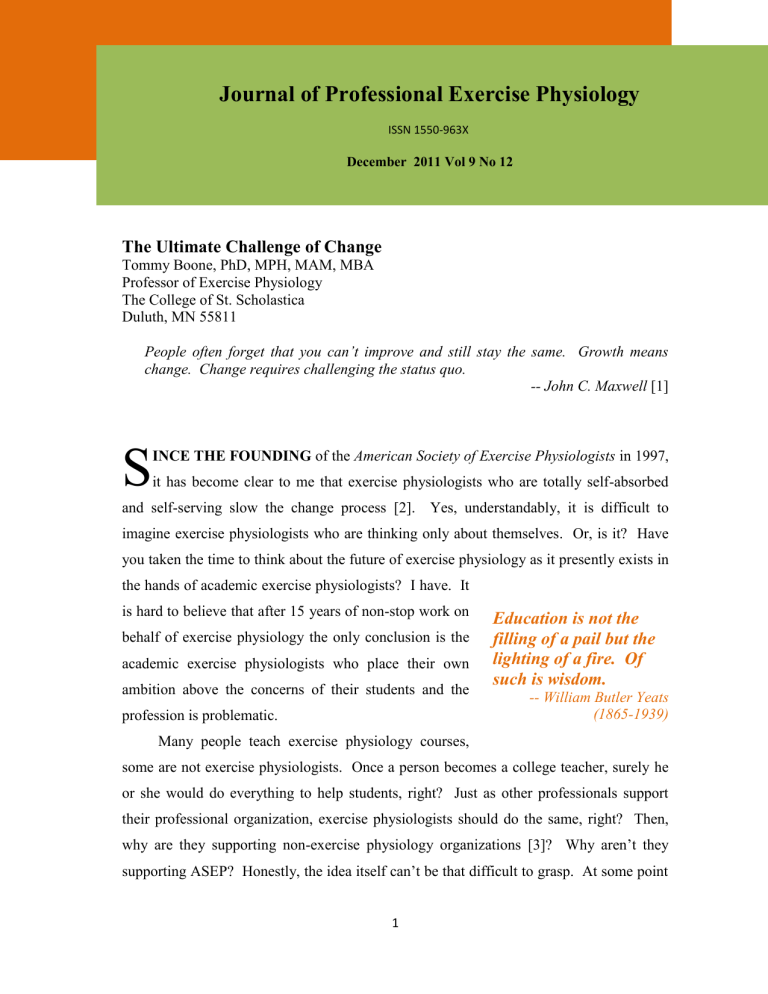
Journal of Professional Exercise Physiology
ISSN 1550-963X
December 2011 Vol 9 No 12
The Ultimate Challenge of Change
Tommy Boone, PhD, MPH, MAM, MBA
Professor of Exercise Physiology
The College of St. Scholastica
Duluth, MN 55811
People often forget that you can’t improve and still stay the same. Growth means change. Change requires challenging the status quo.
-- John C. Maxwell [1]
S INCE THE FOUNDING of the American Society of Exercise Physiologists in 1997, it has become clear to me that exercise physiologists who are totally self-absorbed and self-serving slow the change process [2]. Yes, understandably, it is difficult to imagine exercise physiologists who are thinking only about themselves. Or, is it? Have you taken the time to think about the future of exercise physiology as it presently exists in the hands of academic exercise physiologists? I have. It is hard to believe that after 15 years of non-stop work on behalf of exercise physiology the only conclusion is the academic exercise physiologists who place their own ambition above the concerns of their students and the profession is problematic.
Education is not the filling of a pail but the lighting of a fire. Of such is wisdom.
-- William Butler Yeats
(1865-1939)
Many people teach exercise physiology courses, some are not exercise physiologists. Once a person becomes a college teacher, surely he or she would do everything to help students, right? Just as other professionals support their professional organization, exercise physiologists should do the same, right? Then, why are they supporting non-exercise physiology organizations [3]? Why aren’t they supporting ASEP? Honestly, the idea itself can’t be that difficult to grasp. At some point
1
the exercise physiologist must begin to think of him or herself as a member of a healthcare profession [4]. As the novelist Leo Tolstoy observed, “Everyone thinks of changing the world, but no one thinks of changing himself.”
The rhetoric of academic exercise physiologists fails to argue for changing exercise science to exercise physiology. Yet, it is strange to realize exercise physiologists have failed to think as a professional [5] versus as a researcher. It seems the reason is simply they don’t see the big-picture. Without it, they continue to think as they did yesterday and decades before. Where is the maturity? Why is the perspective that their colleagues in
The future is purchased at the price of vision in the present.
-- Samuel Johnson
(1709-1784) other fields have? Why aren’t they asking questions?
Why aren’t they listening to what is going on around them? Why aren’t they thinking outside the box?
Intuitively, people should know they are responsible for educating students. They are responsible for preparing them for the workplace. Whether students decide to apply for graduate school should be a secondary function of the undergraduate degree. It should not be an expected behavior just to locate a job when every college graduate should already be prepared for a credible job [6]. Otherwise, what is the value of the degree and, if it doesn’t have any value, then, it must be meaningless. Why get into debt paying for a college degree that isn’t going to help a person locate a credible job?
It is pastime that exercise physiologist find the time to focus on what is important?
It is pastime to see the big-picture? For certain, it should help with understanding the problems that drive the increased credibility and financial gap between physical therapy graduates (the haves) and exercise physiology graduates (the have-nots). Failing to take into account that exercise science and related degree programs are not exercise physiology is a function of exercise physiologists’ lack of commitment to change [3] and their own professional development.
Meanwhile, students who have the desire to be an exercise physiologist must now be content with a degree in exercise science or human performance. There is evidence that increased access to exercise science, kinesiology, and sports sciences has perpetuated if not exacerbated the workplace opportunities since the educational curriculum of each is
2
poor and unfocused. After going to college, it shouldn’t mean that now you need to sit for a personal trainer certification.
The result, although not presently understood, is a measure of the dilemma that students face. It is in fact discrimination against college graduates who feel justified in their negative thinking about the academic department and the university. Strange as it may seem, students believe that the quality of their postsecondary education is the responsibility of professors. The academic major is naturally link to the idea that college graduates will find credible jobs resulting from a credible degree program.
Parents also believe that the professors should be held accountable for failing to rethink the 20th century academic degree. Unfortunately, history is littered with examples where key individuals failed to respond to the reasons to change. As a result, without the serious self-
Truth may be stretched but cannot be broken, and always gets above falsehood, as oil does above water.
-- Miguel Cervantes examination and reform, institutions of higher education will continue to fail in preparing students for jobs in the “new economy.”
(1547-1616)
Colleges are taking on too many roles and doing none of them well. They are staffed by casts of thousands and dedicated to everything from esoteric research to vocational training—and have lost track of their basic mission to challenge the minds of young people. Higher education has become a colossus—a $420-billion industry—immune from scrutiny and in need of reform
-- Andrew Hacker and Claudia Dreifus
[7]
It is believed that many college teachers have lost track of their basic mission [7]. They are lazy or self-serving. If it isn’t leaving campus to attend a meeting or turning their classes over to graduate students, it is completing the paper work for a promotion or a sabbatical. What is obvious is that they are profoundly uninterested in teaching, which is partly a function of not being prepared to teach. It isn’t easy or even appropriate to blame
3
professors unless of course they are at the center of the problem. Clearly, they should be asking questions, but they aren’t doing so.
1.
Why aren’t the doctoral programs in exercise physiology updated with an exercise physiology vision, code of ethics, philosophy, accreditation, and scope of practice?
2.
Why is the same thinking taking place at the undergraduate level year after year without planning for and/or teaching professionalism?
3.
Why is it that the so-called clinical exercise physiologist fails to realize that in actually they are simply exercise physiologists?
4.
Why aren’t exercise physiologists creating their own network of friends and colleagues to promote professionalism in exercise physiology?
In regards to what is typically known as exercise physiology, such as exercise science, kinesiology, and related academic majors, is not exercise physiology! Also, if it isn’t clear today that the exercise science and related degree programs consist of essentially the same courses physical education students took in the 1960s, it will be. It is unfortunate that there are American colleges and universities that are a complete failure when it comes to a commitment to quality and professionalism.
To be sure, groupthink [8] can protect the careers of mediocrities who believe a non-profession-specific organization is “the” professional organization of exercise physiologists. Clearly, an organization that has traditionally been physical education,
Learn not to laugh at the truth because sooner or later it will bite you where it hurts.
medicine, and physiology is not an exercise physiology organization. Even if the generic organization is interested in discovering physical training regimens to cope with cardiovascular diseases, it is still a generic organization! To continue supporting such thinking diminishes the true power of “exercise is medicine” when administered by exercise physiologists as credible healthcare professionals [9].
If exercise physiologists want to become recognized as healthcare professionals and not as fitness instructors or personal trainers, they need to work at it – and once they become 100% convinced of the work that must be done, then, the battle is won. Learning how to think as a healthcare professional [10] and not as a personal trainer or something
4
else that a non-exercise physiologist comes up with is worth the effort and time invested.
So, how does the thinking process begin? It all starts with changing how you think about exercise physiology. Exercise physiology is a profession of healthcare practitioners [11] and not a research discipline designed around an idea that generated 60 or 70 years ago.
The process begins with believing in the exercise physiologist’s ability to prescribe exercise as medicine in ways more effective than non-exercise physiologists. It is having the determination and willingness to stay the course even when colleagues and others are more interested in not thinking.
As the billionaire entrepreneur Richard M. DeVos said, “The only thing that stands between a man and what he wants from life is often merely the will to try it and the faith to believe that it is possible.” The belief
No legacy is so rich as honesty.
-- William Shakespeare
(c. 1564-1616) that exercise physiologists have the right to their own professional organization holds power to ensure that all exercise physiologists will be supported and aided by the hard work of positive expectations. The belief in the exercise physiologist’s right to be a credible healthcare professional holds great power. It agrees with the idea that “It’s up to you.”
The ASEP leaders expect to succeed, regardless of how long it may take [12]. They understand the commitment to basic science research is both important and necessary, but so is the expectation of success as recognized experts in the scientific prescription of exercise to build and improve the health and well-being of the public sector. It is this expectation of something better that drives and coincides with the belief that exercise physiologists are healthcare professionals. Hence, why not dream one size bigger than all the other exercise physiologists? Why not stop settling for what you have now (i.e., exercise physiology is the acute and chronic adaptations to exercise)? Why not take comfort in knowing that exercise is medicine and, therefore, exercise physiologists are healthcare professionals?
“Changed thinking” it is very much like what led to the founding meeting of the
“Federation of Sports Medicine” in New York at the Hotel Statler on April 22, 1954. The following year the American College of Sports Medicine was officially incorporated [13].
Now, exercise physiologists must find themselves in the company of other exercise
5
physiologists to associate with so that they will collectively teach each other to think at their level and to discern their strengths, weaknesses, and concerns. Too long now exercise physiologists have found themselves in the mix of professionals from other fields of study that has resulted in accepting the status quo. The decades of influence has kept exercise physiologists from dreaming their own dreams. Living in the past has kept exercise physiologists from thinking as exercise physiologists, and creating the future of exercise physiology [14].
Just imagine what exercise physiology would be today had the physical educators who were then interested in “physiology of exercise” started their own organization.
Instead of supporting and developing a generic organization, they have put all their energy into developing and improving exercise physiology as a profession. Today, students who want to be an exercise physiologist would not major in kinesiology with a concentration in exercise physiology. They would take courses accredited by the professional organization of exercise physiologists. They would find credible employment in the public sector that is specific to their professional standards of practice. Their work would be guided by their own professional code of ethical standards. In short, the exercise physiologists would be recognized as healthcare professionals [15].
It isn’t too late to challenge the status quo. It isn’t
Tis strange but true; for truth is always strange – stranger than fiction
-- Lord Byron
(1788-1824) too late to start thinking like an exercise physiologist. The
“rubbers’ (i.e., athletic trainers) changed their thinking and look at them today. Think what it would mean if exercise physiologists worked together. As George Bernard Shaw said, “Some men see things as they are and say, ‘Why?’ I dream of things that never were and say, ‘Why not?’” People who believe they can, do.
So, why not build our own profession just as others have done? One way to do so begins with write about the idea itself.
John C. Maxwell [1] said, “Learning to write is learning to think.” So why not put shape to your thoughts and publish an article in the PEPonline journal? Your thoughts and ideas can have an influence on the minds of others. Find a place and the opportunity to put your thoughts on paper and have an impact on exercise physiology. The key to the future of exercise physiology is perseverance and service. Writing one good article isn’t
6
enough. Write 10 or 50 or maybe even a 100 articles. It doesn’t matter if you are a college student or a professor who is popular or unpopular. You don’t need anyone’s permission to share your ideas while learning how to think better by writing. Just do it!
There is a true glory and a true honor; the glory of duty done – the honor of the integrity of principle.
-- Robert E. Lee
(1807-1870)
References
1.
Maxwell, J. C. (2003). Thinking For A Change . New York, NY: Center Street.
2.
Boone, T. (2011). Making the Most of Change. Exercise Physiologists . [Online]. http://exercisephysiologists.wordpress.com/
3.
Boone, T. and Rademacher, E. (2001). The Sports Medicine Myth.
Professionalization of Exercise Physiologyonline.
14:7 [Online]. http://faculty.css.edu/tboone2/asep/SportsMedicineMyth.html
4.
Boone, T. (2010). The Language of Professionalism in Exercise Physiology.
Journal of Professional Exercise Physiology.
8:1 [Online]. http://faculty.css.edu/tboone2/asep/LanguageOfProfessionalismInExercisePhysiol ogy-3.doc
5.
Boone, T. (2011). The New Exercise Physiology. Boonethink.com/ [Online]. http://boonethink.com/?page_id=110
6.
Boone, T. (2011). Contemporary Exercise Physiology: The Big-Picture.
Professionalization of Exercise Physiologyonline.
14:3 [Online]. http://faculty.css.edu/tboone2/asep/Contemporary_Exercise_Physiology_The_Big
_Picture.docx
7.
Andrew Hacker, A. and Dreifus, C. (2010). Are Colleges Worth the Price of
Admission . Times Books/Henry Holt.
7
8.
Boone, T. (2010). Preventing Groupthink in Exercise Physiology.
Professionalization of Exercise Physiologyonline.
13:11 [Online]. http://faculty.css.edu/tboone2/asep/PreventingGroupthinkInExercisePhysiology.do
cx
9.
Boone, T. (2009). The Exercise Physiologist’s “Prescription Pill” is Exercise.
Professionalization of Exercise Physiologyonline . 12:3 [Online]. http://faculty.css.edu/tboone2/asep/TheExercisePill.pdf
10.
Boone, T. (2007). The Future of Exercise Physiology in Healthcare. Journal of
Professional Exercise Physiology . 5:2 [Online]. http://www.exercisephysiologists.com/JPEPFeb2007FutureofEPinHealthcare/inde x.html
11.
Boone, T. (2003). Exercise Physiologists, Critical Thinking, and the Questioning
Mind. Professionalization of Exercise Physiologyonline.
6:9 [Online]. http://faculty.css.edu/tboone2/asep/ExercisePhysiologistsCriticalThinkingQuestion ingMind.html
12.
Boone, T. (2002). Exercise Physiologists Locked in the Past. Professionalization of Exercise Physiologyonline . 5:5 [Online]. http://faculty.css.edu/tboone2/asep/EPsLockedINthePast.html
13.
Berryman, J. W. (2004). The American College of Sports Medicine: 50 Years of
Progress and Service, 1954-2004. Medicine & Science in Sports & Exercise.
36:1:1-10.
14.
Boone, T. (2011). Speaking the Truth. Boonethink.com/ [Online]. http://boonethink.com/?page_id=139
15.
Boone, T. (2001). Professional Development of Exercise Physiology . Lewiston,
NY: The Edwin Mellen Press, Ltd.
8
